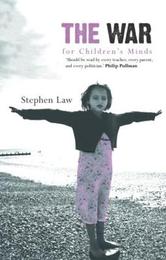
|
The War for Children's Minds
Paperback
Main Details
| Title |
The War for Children's Minds
|
| Authors and Contributors |
By (author) Stephen Law
|
| Physical Properties |
| Format:Paperback | | Pages:208 | | Dimensions(mm): Height 216,Width 138 |
|
| Category/Genre | Ethics and moral philosophy |
|---|
| ISBN/Barcode |
9780415427685
|
| Classifications | Dewey:649.701 |
|---|
| Audience | | Undergraduate | | Postgraduate, Research & Scholarly | | Professional & Vocational | |
|---|
| Edition |
New edition
|
| Illustrations |
Illustrations
|
|
Publishing Details |
| Publisher |
Taylor & Francis Ltd
|
| Imprint |
Routledge
|
| Publication Date |
24 May 2007 |
| Publication Country |
United Kingdom
|
Description
How do we raise good children? How do we make good citizens? In defiant yet acute fashion, Stephen Law urges us to re-evaluate the liberal tradition of thinking about morality. Tackling authoritarian rhetoric head-on, he argues that children should learn about right and wrong, and respect for others, but that their education should be grounded in the hard-won values of the Enlightenment. Taking on neo-conservatives and religious and media commentators, The War for Children?s Minds is a candid and controversial call for a liberal, philosophically informed approach to raising children. Rejecting accusations that liberal parenting is a Sixties hangover that entails an aimless 'whatever? attitude to morality, Stephen Law exposes the weaknesses of arguments calling for a return to authoritarian styles of moral education. He clearly shows that thinking for oneself does not mean that all moral points of view are equally good, or that we must reject faith in order to think freely.
Author Biography
Stephen Law is the author of the bestselling The Philosophy Files, The Outer Limits and The Philosophy Gym. He is a contributor to The Independent on Sunday and editor of the Royal Institute of Philosophy journal Think: Philosophy for Everyone. He lectures in Philosophy at Heythrop College, University of London.
Reviews'"The War for Children's" "Minds "is a brilliantly clear and convincingly argued defence of liberalism in moral education. Stephen Law examines and demolishes all the arguments in favour of authoritarian ways of teaching, and shows that in spite of the insistence of popular commentators from the religious right, a liberal and rational examination and discussion of moral questions does not lead to relativism and the decay of ethical behaviour, but can in fact be the best defence against them. This book won't be read by popular journalists: they will attack it without reading it. But it should be read by every teacher, every parent, and every politician. What's more, it should form the subject for discussion in every church, synagogue, mosque, and religious youth group. It's one of the most engaging as well as one of the most necessary books that I've ever read in the field of moral education.' " - Philip Pullman" 'Progressives schools, they say, promote the wishy-washy, anything goes mentality that is the source of our social malaise. In The War for Children's Minds, Stephen Law does a splendid and philosophically thrilling job of cutting that argument to shreds.' "- The Guardian" '...a succinct and eloquent defence of liberalism.' "- The Economist" 'A stirring defence of liberal values.' "- Times Educational Supplement" 'A passionate philosophical defence of a liberal approach to parenting and education.'" -" "The Guardian " 'This defence of reason should be obligatory reading, not just in schools, but in parliament and the press. '" -" "Sunday Herald" '[The] debate about children's education!seems to be dominated by the other side. It's a side that believes Liberal is a dirty word, that the Enlightenment did more harm than good and that children should be taught in a much more formal way. In his book [Law] begs to differ. He suggests that children should be allowed to examine and discuss religious and moral issues in a liberal, philosophically informed and rational way.' "- The Oxford Times" '...this volume has a hugely significant contribution to make. It is also highly readable, and provides a useful pocket guide to current philosophical thinking - a sort of religious Bill Bryson.'" - Church Times"
|